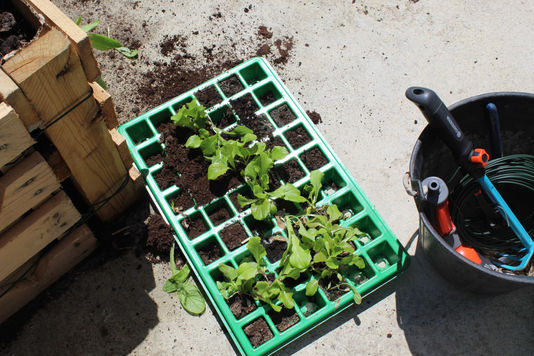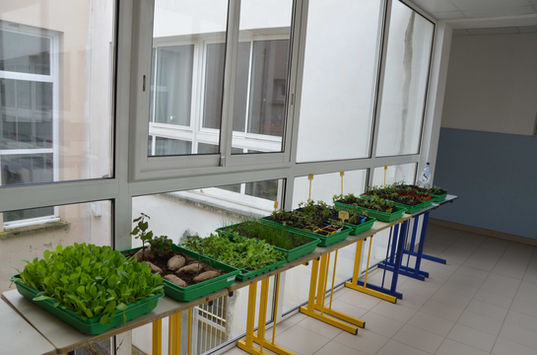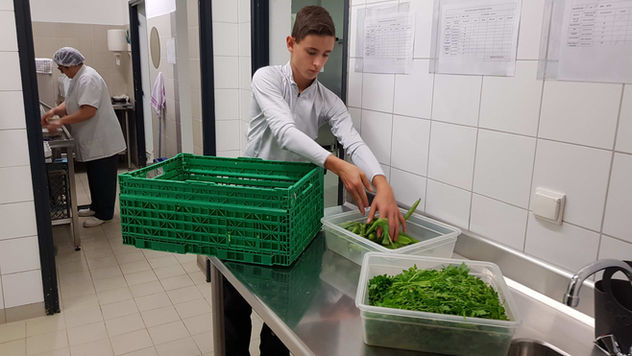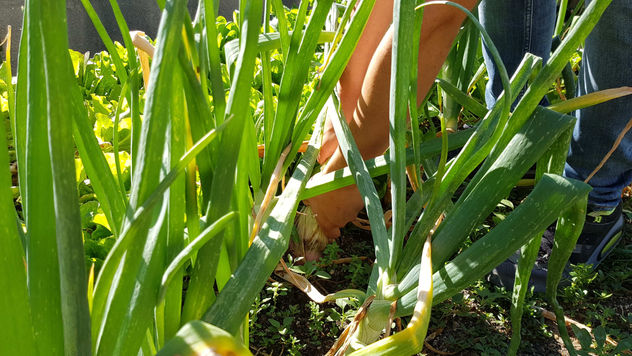
E3D/EDD Au collège de Moltifao
PERMACULTURE, EDD PROGRAM AND E3D LABEL IN SCHOOLS
College of Moltifao, an example in Corsica
Integration of the EDD program and E3D labeling . Presentation of the teaching case for a middle school (140 students).
Human resources mobilized : 1 referent teacher and project leader (Nicolas Perreaux), 4 mobilized teachers, 1 voluntary school head, an external worker.
Production / support: 12 sessions, one per month + support for teachers in areas with 3 preparation sessions for the educational project and activity reports.
Educational support and tools: 1 pilot garden, 1 henhouse with 11 hens, 2 large composters , seeds, pallets, bales of straw, potting soil.
Recycling capacity of organic waste:
In total, about 3000 kg were recycled don 1500kg by our hens (up to 150kg per hen per year) and by our composters with a capacity of 2m3.


Permaculture EDD program / E3D label, ecological transition, training for ecology teachers


Educational program
-
Validation of the knowledge and skills of the subjects taught through a systemic study of the establishment's ecological footprint and the implementation of practical solutions to reduce its environmental impact.
A socio-environmental dimension: Establishment of an awareness program for recycling bio-waste within the establishment, towards a circular economy.
-
One dimension of action: Recycling through composting and the use of laying hens within the establishment.
-
A social dimension: Developing an eco-citizen awareness through the support of eco-delegates to promote environmentally friendly behavior in their class, supporting the awareness-raising process.
-
A health and nutrition dimension: Children's discovery of vegetables from seed to plate helps them reconcile with these unloved strangers.
-
An economic dimension: Initiate a concrete circular economy approach through the recycling of waste transformed into raw materials for the garden and inducing the creation of local wealth.
-
Production achieved:
Feasibility and impact study (diagnosis, assessment and recommendations).
General Info:
General Info:
Project leader : Rectorate of Corsica , college of Moltifao
Design, project management, training, support: Fabien Tournan, Régénération Végétale
Modules put in place: vegetable garden, organic waste sorting and recycling unit, henhouse, composting area, "ecological transition" and "inter-generational shared garden" design office
Duration of the project: a renewed school year (third year!)
Public concerned: 150 students, plus the teaching, administrative and canteen team of the college
Le projet en image
STUDY OFFICE FOR ECOLOGICAL TRANSITION
Studying energy consumption
The students are divided into groups, the goal is to make an inventory of all college entrants and find alternative solutions to save money!
-
Food group: budget, origin, quality of the food in the canteen
-
Electricity group: study of bills, electricity consumption, consumption per floor, alternative solutions to reduce the bill and the ecological impact.
-
Water Group: calculates the school's water recovery potential, annual consumption in m3, balance sheet and consumption of indoor and outdoor bathrooms, alternatives.
-
Food autonomy group: food production, need, life cycle, production, harvest, seed production.
ESTABLISHMENT OF A FOOD PRODUCTION GARDEN AT THE COLLEGE
Prepare a multifunctional work tool
- A tool allowing to assimilate, to put in perspective the learning of the school program. The need to run outdoors, standing, the body active.
To do this, Nicolas Perreaux and his students with the support of their management and their colleagues have set up an educational garden.
FOOD AUTONOMY AND SCHOOL PROGRAM
Garden workshop, learn differently
- The garden helps pupils to become aware of the issues related to food production and opens a
process of reflection on our relationship to the world and its fragility.
- The garden makes it possible to put into practice in a concrete and non-virtual way mathematics, work
writing, ecology, health nutrition, life sciences, and many other subjects.
Seedlings.
Culture.
The interview.
The harvests.
SEEDLING
From seed to plate
Sow.
Maintain.
Transplant.
SEEDS
Reproduce, test, preserve
Seed production in schools:
Understand the reproduction of plants.
Select , adapt.
Harvest, list, condition.
HARVESTING AND DISTRIBUTION OF VEGETABLES
Harvest your vegetables and bring them to the kitchen!
Harvesting of vegetables by the pupils.
Cleaning.
Delivery to the kitchen.
Preparation of vegetables within the hour!
RECYCLING, SETTING UP SUPPORT TOOLS FOR THE TRANSITION
Waste recycling integrated into the school curriculum
Set up waste management tools for students
Establishment of eco-delegates.
Sorting and recycling in the canteen with supervision and awareness of the pupils.
Weigh quantities, follow up with a waste register, create graphs to track the impact of awareness raising.
Recycling of bio-waste by composters and recycling hens.
Transformation of waste into resources for the "compost" garden.
ABOVE-GROUND CULTURE
Installation of an above ground garden on concrete
A growing tank with cherry tomatoes, aromatics and salads vertically!
Pallets.
Cardboard without ink and cleaned of its tape.
Untreated hay or straw bales.
Compost.
INTER-SCHOOL WORKSHOP WITH PRIVATE PARTNERSHIP
The Hotel le Monte d'Oro welcomes and finances an above-ground pilot garden
Creation of an above-ground garden with pallet recovery, water tank, straw bale ...
installation of culture containers
planting, sowing, maintenance
Inter-school worksite College / primary
HOLIDAY MIGRATION
You want to carry out this type of educational project ?
Training is available:
Become an environmental science facilitator.
Establish the needs of an ecology project territorial for food production.
Establish shared gardens adapted to a municipality.
Create recycling spaces in urban districts or villages.
You want to carry out this type of educational project ?
Training is available:
Become a facilitator in environmental sciences.
Establish the needs of an ecology project territorial for food production.
Establish shared gardens adapted to a municipality.
Create recycling spaces in urban districts or villages.



.png)


























































































































































